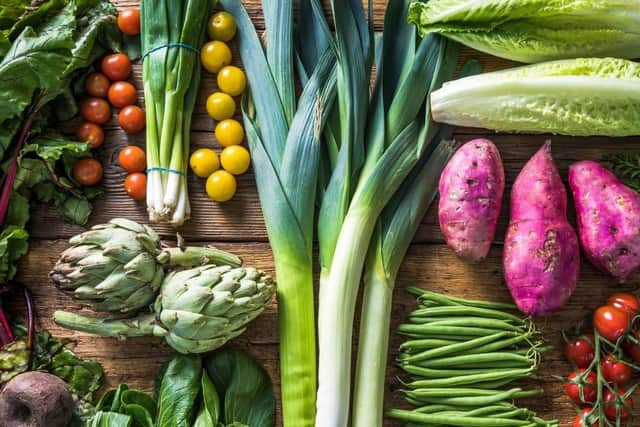Local produce can be so much more than turnips and potatoes
and live on Freeview channel 276
There has been some healthy debate about the cause of the recent issues; rising energy costs, lack of workforce, Brexit, a one-off weather event or a changing weather pattern due to climate change.
Whatever the reason, it’s time to think about how to build a more resilient food supply chain.
Advertisement
Advertisement
I recently attended a webinar led by the Protein-I project, which is seeking to future-proof Ireland’s food supply chain.


They reported that we are currently importing £130 million of potatoes, onions, carrots, and cabbage.
These are all crops that we know we can grow here.
The products currently missing from the shelves are the salad items which we simply couldn’t grow here without putting in lots of heat and light, which is unlikely to be financially or environmentally sustainable.
The suggestion that a solution is to eat more seasonally was ridiculed in the press recently but shouldn’t be dismissed so quickly, we can grow a lot more than turnips.
Advertisement
Advertisement
I help chefs to source locally grown produce, and it certainly gets a bit tougher during this ‘hungry gap’, but working with many small growers around the country, we can still find a good variety.
Jerusalem artichokes, leeks, beetroot, kale, cabbage, purple sprouting broccoli, crosnes, celery and various herbs are all available.
We are also starting to see the natural bounty appear in woodlands and hedgerows with wild garlic, gorse flowers and bramble shoots.
Most of us walk past these on our farms daily, but there is an emerging market for them as chefs look for more interesting local produce.
Advertisement
Advertisement
If you are watching the current series of Great British Menu, you might have noticed the amount of foraged ingredients.
I had to look up wild chervil which seemed to appear on every dish, it’s what I would call cow parsley, and it’s delicious and all over our hedgerows.
Last year, we made a nice profit from our hedgerows selling nuts and berries. You could say the picking is labour intensive or look at it as leisure time and just enjoy the walk.
Only four per cent of our agricultural output in Northern Ireland is from horticulture compared to 14 per cent in the UK and more like 44 per cent in Europe.
Advertisement
Advertisement
We perceive that we can’t grow much except grass, but the fruit, vegetables and herbs we produce are world-class, especially when they are being picked in the morning and put on a plate in a restaurant that evening.
We worked with an agronomist to compile a list of crops that can be grown in Northern Ireland, there are around 150 varieties, and that’s before we look at the wild, foraged produce.
More diverse crops mean a more resilient system.
If one thing fails or the price drops, we can balance it out.
Diversity in our crops also supports diversity in our wildlife, benefitting the whole ecosystem.
Advertisement
Advertisement
Shorter supply chains mean more profit and much better food that hasn’t travelled so far.
Local produce can be so much more than turnips and potatoes—time to rethink food.
The Nature Friendly Farming Network is led by farmers across the UK with a passion for sustainable farming and nature.
They seek to unite farmers across the UK who have a sustainable outlook and to secure positive changes in policy, including how farming is supported by the public.
Advertisement
Advertisement
The Nature Friendly Farming Network believe that nature friendly farming is not only better for nature, but is also the most productive and sustainable way of getting food from the land.
Many farmers are already playing an incredible role in helping wildlife flourish on their farms – the Nature Friendly Farming Network believe that they should be better supported and rewarded for their good work.
You can join the network as a farmer member, a public member or a supporting organisation.
Joining is free and you can add your voice to a movement of like-minded people.
Visit https://www.nffn.org.uk/join-us/ to find out more about joining.